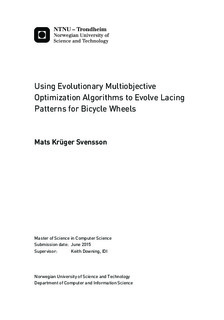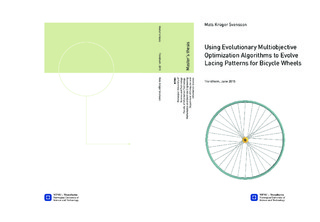| dc.description.abstract | This thesis investigates the use of evolutionary algorithms (EAs) to evolve and optimize lacing patterns of spokes for a bicycle wheel. There are multiple objectives and tradeoffs to be considered when evaluating a lacing pattern, for instance, strength versus balance. To handle this, an evolutionary multiobjective optimization (EMO) method has been used.
Various EMO algorithms and approaches are tested. Among these, the new NSGA-III algorithm is used. Different representations of the lacing patterns for the wheels are compared, and also two different representations of the problem for the EMO.
A novel wheel simulator has been made to test the lacing patterns. As the number of needed wheel simulations take a considerable amount of time, the work is distributed among multiple computers.
The EMO is successful in the search for good lacing patterns. One of the most common patterns, the 3x, is found, along with other comparable patterns with different tradeoffs.
The results show no improvement in using the new NSGA-III algorithm compared to the older NSGA-II. The representation with a bias for uniformly laced spokes let the EA evolve better wheels than other representations, showing that carefully choosing the representation for what is being optimized is important. The results also show how important it is to represent a problem using multiple objectives when possible, as the wheels evolved using a higher number of objectives were found to be best. | |

